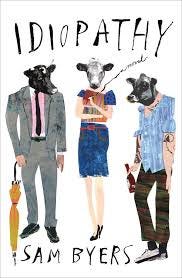Books & Culture
Review: Idiopathy, by Sam Byers

A debut novel portrays the derangements of modern life with blistering satire and gallows humor

As its title indicates, Idiopathy is about what bloody idiots people are. While delivering one laugh-out-loud zinger after another (many of them too raunchy to be quoted here), Byers lampoons, with excoriating wit, the hash we have made of modern life, and the hash it has made of us.
In the English city of Norwich — which may bring to mind Slough from the UK version of The Office — Katherine, Daniel and Nathan compulsively reject the promises of potential intimacy that keep rearing up between them. Meanwhile, Bovine Idiopathic Entrancement Syndrome is spreading through Britain’s cattle population. The cows now stare, motionless, into space; and halfway through the book, the disease has spread to sheep. The implication being, we’re next.
The novel is a triple portrait, told in smoothly rotating points of view. Daniel and Katherine are ex-lovers who fight ceaselessly and viciously. Nathan, their erstwhile drug dealer, used to provide a point of triangulation for them. Now that Nathan, newly sober, is out of rehab, their old dynamic doesn’t hold, but none of them can walk away.
Katherine is having a brutishly impersonal sexual relationship, of which Byers probes every embarrassing corner with surprising insight and humor. When an accidental pregnancy threatens to breach her defensive fortress of rage, she implodes. Eaten alive by bitterness, Katherine is a tricky character to pull off. Like a friend who begins, “You know what your problem is?” and then actually speaks the awful truth, she is part avenging angel, part monster.
For Daniel, rule-bound and incapable of spontaneity, there is only one directive: behave properly. To always behave “properly” is to be false; but to be sincere, one must take risks, and Daniel will risk nothing. Pinned in place by paralyzing cowardice, his life with his cloyingly sweet girlfriend Angelica holds no real pleasure save that of accumulating stuff. “Lacking children as they did,” Byers writes, “Daniel and Angelica needed something to tend to or they risked falling into the kind of vapid complacency they both professed to fear but also secretly craved.” Bovine entrancement, indeed.
Nathan is getting back on his feet at his parents’ house — awkward, since his mother is busily promoting her blockbuster book Mother Courage: One Woman’s Battle Against Maternal Blame (with the help of Dr. Dave, personal development guru and author of C.H.A.N.G.E: Calling a Halt to All Negative and Gloomy Experiences). While his mother could be seen as the current face of British parenting, his father, rigid to the point of calcification, seems to represent an older tradition: “He was like an ocean liner: a change of mind was painfully slow and required a complex pattern of braking and turning before thrust could be reapplied.” Like so many lines in the novel, it elicits first a laugh, then heartbreak.
Through Nathan’s eyes, we come to grips with what it means to acclimatize to society. Familiar surroundings, like the supermarket, are tinged with existential horror when looked at anew. “People ate as they roamed the shop. When their children started to cry, they encouraged them to eat. On every aisle there was at least one child sobbing gutturally through the wilting remains of a Snickers.”
Of the three, only Nathan appears not ruled by self-interest; in fact he attempted to destroy his old self at a rave during which he mutilated his body. But as his humanity filters back to him, so too does its dark side. His first impulse of individuation is to steal parents’ credit card, in order to purchase his mother’s specious books and then throw them in the river. Later, the possibility of intimacy with Katherine provides incentive to let himself slide.
This brings up the issue of whether Byers has written a searing exploration of the engines that drive self-destruction, or merely a funny, pointed satire. In laying bare his character’s worst qualities, there are times when he seems to be implementing a scorched-earth policy. We spend so much time exploring his characters’ delusions, we barely get a sense of where their essential goodness — if they have any — might lie. On the other hand, it’s not an author’s job to make us comfortable, and it is clear that Byers is writing from the heart. If he struggles to have faith in our collective kernel of human good, he clearly still trusts in that most human of gifts: gallows humor. And in his deft hands, it is certainly a gift.
Idiopathy will be released in the U.S. on June 4, 2013.
Recommended if you enjoyed: Lionel Asbo by Martin Amis, Great Apes by Will Self, England, England by Julian Barnes
***
— Jenna Leigh Evans writes fiction in Brooklyn. You can find her here.









